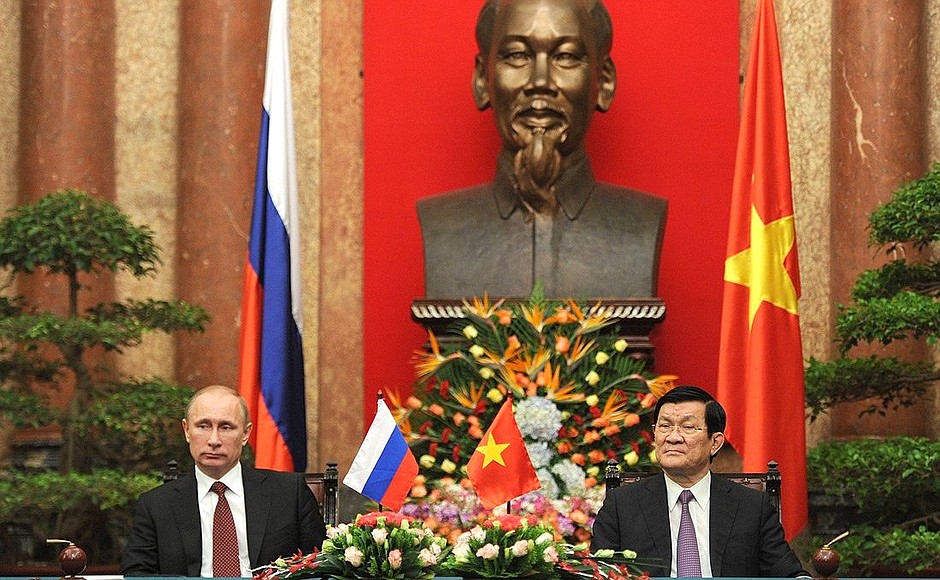
President of Russia Vladimir Putin: Friends,
Our talks with President Truong Tan Sang took place – as in previous years – in a constructive and business-like atmosphere. Vietnam is one of the fastest growing countries in the Asia-Pacific region and one of Russia’s long-standing, reliable partners.
Our political dialogue is at a very high level. We discussed the key aspects of our comprehensive strategic partnership. We also paid considerable attention to trade and investment, as well as economic cooperation.
In 2012, our bilateral trade grew by almost 20 percent and reached $3.6 billion. These are excellent indicators, but naturally our economic cooperation has a much greater potential.
Trade can be further increased by creating a free trade zone between Customs Union members and Vietnam. Active negotiations to this effect are underway.
Cooperation in the energy sector is developing well. The joint venture Vietsovpetro has already extracted 206 million tonnes of oil from the continental shelf. Together with Gazprom and Zarubezhneft, the Vietnamese company Petrovietnam is implementing projects to develop oil and gas fields in the Russian Federation.
Oil refining represents new ground for Russian-Vietnamese cooperation. We signed an agreement whereby Gazprom Neft will take part in modernising the Dung Quat oil refinery. Gazprom Neft will deliver oil to the refinery and participate in marketing the finished product.
We also plan to organise deliveries of Russian liquefied natural gas to Vietnam.
Gazprom and Petrovietnam have established a joint venture to produce natural gas motor fuel. This project will help improve the environmental situation, and the resulting product will be used by Vietnamese public transport.
With Russia’s assistance a virtually new high-tech industry is being created in the Socialist Republic of Vietnam: the nuclear industry. Our joint plans include not only building nuclear power plants, but also training Vietnamese nuclear scientists, as well as creating a Centre for Nuclear Science and Technology here in Vietnam.
We agreed to pay special attention to industrial cooperation. Russian companies KAMAZ and GAZ [Gorky Automobile Plant] plan to work in the automotive industry, while Uralvagonzavod will help oversee the technological upgrading of companies that produce heavy machinery. We also aim to cooperate in aviation and in outer space.
We spoke in detail about defence cooperation: we intend to expand the range of up-to-date products we supply to the Vietnamese army. As you saw, our defence departments signed a new intergovernmental agreement, which includes continuing assistance with personnel training for the Vietnamese Army and Navy.
We agreed to deepen humanitarian ties. Today the opening ceremony of the Days of Russian Culture will take place. Performances by well-known Russian performers and ensembles are on the programme in Hanoi and Ho Chi Minh City, and our museums will exhibit parts of their collections. I am sure that the Days of Hanoi, which will be held in Moscow in late November, will be similarly successful. The amount of tourism between our countries is increasing.
We are paying particular attention to contacts in education. More than 52,000 Vietnamese graduates have been trained in Russia, and there are currently about 5,000 citizens of the Socialist Republic of Vietnam studying in Russia.
Today we signed an intergovernmental agreement to increase the number of Vietnamese students at Russian universities. A project to establish a Vietnamese-Russian University of Technology in Hanoi is underway.
In conclusion I would like to thank the President of Vietnam and all our Vietnamese friends for their warm welcome. I am confident that the agreements we reached will help expand our cooperation and benefit our nations.
I invited the President of Vietnam to visit Russia, and I hope that we will be able to meet at his convenience.
Thank you.